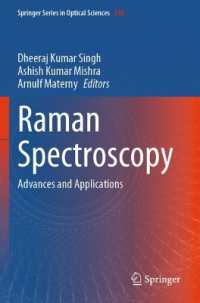- ホーム
- > 洋書
- > ドイツ書
- > Humanities, Arts & Music
- > Philosophy
Description
(Short description)
Die Reihe Monographien und Texte zur Nietzsche-Forschung (MTNF) setzt seit mehreren Jahrzehnten die Agenda in der sich stetig Nietzsche-Forschung. Die Bände sind interdisziplinär und international ausgerichtet und spiegeln das gesamte Spektrum der Nietzsche-Forschung wider, von der Philosophie über die Literaturwissenschaft bis zur politischen Theorie. Die Monographien und Sammelbände unterliegen jeweils einem strengen Peer-Review.
(Text)
Die Reihe Monographien und Texte zur Nietzsche-Forschung (MTNF) setzt seit mehreren Jahrzehnten die Agenda in der sich stetig verändernden Nietzsche-Forschung. Die Bände sind interdisziplinär und international ausgerichtet und spiegeln das gesamte Spektrum der Nietzsche-Forschung wider, von der Philosophie über die Literaturwissenschaft bis zur politischen Theorie. Die Reihe veröffentlicht Monographien und Sammelbände, die einem strengen Peer-Review-Verfahren unterliegen.
Die Buchreihe wird von einem internationalen Redaktionsteam geleitet.
(Short description)
For several decades, Monographien und Texte zur Nietzsche-Forschung (MTNF) has set the agenda in a rapidly growing and changing field of Nietzsche scholarship. The book series is international in orientation and reflects the entire spectrum of research on Nietzsche. The series publishes monographs and edited volumes that undergo a strict peer-review process.
The series is led by an international team of editors.
(Text)
Nietzsche and Levinas require that we work for a future beyond our own lives, exploring our unique sense of a pre-philosophical ethos and justice in thinking through the other. This book invites us to move through and beyond the affirmative ethics of both thinkers to become advocates for the highest evaluation of ethical sensibility that returns us to a pre-philosophical wisdom which punctuates each moment and questions the justice of all thinking. Nietzsche's Dionysian interruption of subjectivity in a compulsion to ethos, and Levinas' notion of a non-indifference to others refer us to the trace of an ethical encounter with another beyond cultural self-justification. Nietzsche's Übermensch and Levinas' divine comedy of transcendence evoke expansive senses of affirmatory ethos, becoming unique loci for "the good" on earth. Nietzsche's will to power in an eternal recurrence of the same and eternal return and Levinas's thought of il y a and illeity are interruptive events whichtest of our capacity to engage in the wisdom of the affirmation of life. These proposals are developed in the advocacy of the provision of a sanctuary space for ethics and justice in which the affirmation of life questions our right to a place in the sun.
-

- 電子書籍
- 自称空気の読める令嬢は、義兄の溺愛を享…
-

- 文具・雑貨・特選品
- 立正大学キャンパスグッズ Tシャツ (…






